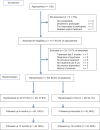Assertive Community Treatment For People With Alcohol Dependence: A Pilot Randomized Controlled Trial
- PMID: 27940571
- PMCID: PMC5378220
- DOI: 10.1093/alcalc/agw091
Assertive Community Treatment For People With Alcohol Dependence: A Pilot Randomized Controlled Trial
Abstract
Aims: A pilot randomized controlled trial (RCT) to assess the feasibility and potential efficacy of assertive community treatment (ACT) in adults with alcohol dependence.
Methods: Single blind, individually randomized, pilot RCT of 12 months of ACT plus treatment as usual (TAU) versus TAU alone in adults (age 18+ years) with alcohol dependence and a history of previous unsuccessful alcohol treatment attending specialist community alcohol treatment services. ACT aimed to actively engage participants for 12 months with assertive, regular, minimum weekly contact. ACT was combined with TAU. TAU comprised access to the full range of services provided by the community teams. Primary outcome is mean drinks per drinking day and percent days abstinent at 12 months follow up. Analysis of covariance was conducted using 80% confidence intervals, appropriate in the context of a pilot trial.
Results: A total of 94 participants were randomized, 45 in ACT and 49 in TAU. Follow-up was achieved with 98 and 88%, respectively at 12 months. Those in ACT had better treatment engagement, and were more often seen in their homes or local community than TAU participants. At 12 months the ACT group had more problems related to drinking and lower quality of life than TAU but no differences in drinking measures. The ACT group had a higher percentage of days abstinent but lower quality of life at 6 months. The ACT group had less unplanned healthcare use than TAU.
Conclusions: An trial of ACT was feasible to implement in an alcohol dependent treatment population.
Trial registration: ISRCTN22775534.
© The Author 2016. Medical Council on Alcohol and Oxford University Press.
Similar articles
-
Assertive Community Treatment for alcohol dependence (ACTAD): study protocol for a randomised controlled trial.Trials. 2012 Feb 20;13:19. doi: 10.1186/1745-6215-13-19. Trials. 2012. PMID: 22348423 Free PMC article. Clinical Trial.
-
Pilot study of assertive community treatment methods to engage alcohol-dependent individuals.Alcohol Alcohol. 2008 Jul-Aug;43(4):451-5. doi: 10.1093/alcalc/agn025. Epub 2008 Apr 24. Alcohol Alcohol. 2008. PMID: 18436573
-
The effectiveness of assertive community treatment for elderly patients with severe mental illness: a randomized controlled trial.BMC Psychiatry. 2014 Feb 15;14:42. doi: 10.1186/1471-244X-14-42. BMC Psychiatry. 2014. PMID: 24528604 Free PMC article. Clinical Trial.
-
Specialised early intervention teams for recent-onset psychosis.Cochrane Database Syst Rev. 2020 Nov 2;11(11):CD013288. doi: 10.1002/14651858.CD013288.pub2. Cochrane Database Syst Rev. 2020. PMID: 33135811 Free PMC article.
-
Alcoholics Anonymous and other 12-step programs for alcohol use disorder.Cochrane Database Syst Rev. 2020 Mar 11;3(3):CD012880. doi: 10.1002/14651858.CD012880.pub2. Cochrane Database Syst Rev. 2020. PMID: 32159228 Free PMC article.
Cited by
-
Why Are Some Male Alcohol Misuse Disorder Patients High Utilisers of Emergency Health Services? An Asian Qualitative Study.Int J Environ Res Public Health. 2022 Aug 30;19(17):10795. doi: 10.3390/ijerph191710795. Int J Environ Res Public Health. 2022. PMID: 36078521 Free PMC article.
-
A new paradigm in management of frequent attenders to emergency departments with severe alcohol use disorder-A pilot study for assertive community treatment in Singapore.Front Health Serv. 2022 Nov 4;2:1029455. doi: 10.3389/frhs.2022.1029455. eCollection 2022. Front Health Serv. 2022. PMID: 36925838 Free PMC article.
-
A Meta-Analysis of the Efficacy of Case Management for Substance Use Disorders: A Recovery Perspective.Front Psychiatry. 2019 Apr 16;10:186. doi: 10.3389/fpsyt.2019.00186. eCollection 2019. Front Psychiatry. 2019. PMID: 31057432 Free PMC article.
-
A qualitative exploration of the barriers and facilitators to the implementation of the alcohol assertive outreach model.Alcohol Alcohol. 2025 Jan 19;60(2):agaf003. doi: 10.1093/alcalc/agaf003. Alcohol Alcohol. 2025. PMID: 39895174 Free PMC article.
-
Addiction Treatment: Who Needs It?J Stud Alcohol Drugs Suppl. 2019 Jan;Sup 18(18):110-111. doi: 10.15288/jsads.2019.s18.110. J Stud Alcohol Drugs Suppl. 2019. PMID: 30681954 Free PMC article. Review. No abstract available.
References
-
- Burns T, Fiander M, Kent A, et al. (2000) Effects of case-load size on the process of care of patients with severe psychotic illness. Br J Psychiatry 177:427–433. - PubMed
-
- Dieterich M, Irving CB, Park B, et al. (2010) Intensive case management for severe mental illness. Cochrane Database Syst Rev doi:10.1002/14651858.CD007906.pub2. - DOI - PMC - PubMed
-
- Department of Health (2007) Drug Misuse and Dependence: UK Guidelines on Clinical Management. London: Department of Health (England), the Scottish Government, Welsh Assembly Government and Northern Ireland Executive.
-
- Drummond C. (1990) The relationship between alcohol dependence and alcohol related problems in a clinical population. Br J Addict 85:357–366. - PubMed
-
- Drummond C, Coulton S, James D, et al. (2009) Effectiveness and cost effectiveness of stepped care intervention for alcohol use disorders in primary care: a pilot study. B J Psychiatry 195:448–456. - PubMed
Publication types
MeSH terms
Grants and funding
LinkOut - more resources
Full Text Sources
Other Literature Sources
Medical


